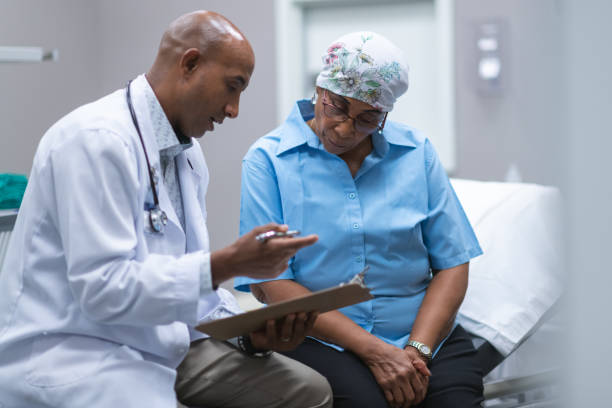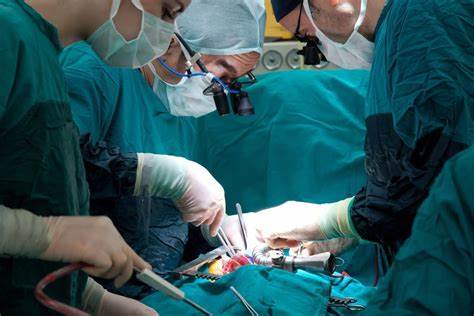Scope of Oncology
Department of Oncology
Oncology is a branch of medicine dealing with the prevention, diagnosis and treatment of cancer. Inherited genetic defects, infections, external environment and poor lifestyle choices (smoking, heavy alcohol consumption) are some factors that may lead to cancer.
Cancer is the second most common disease in world (after cardio-vascular ailments) with breast, cervical, oral and lung cancer being the most common, affecting men and women both. Best management of cancer is possible through multiple modes of treatment based on an individual patient’s physical, social and emotional status.
Wecare Healthcare, Brazzaville, Republic of Congo at Oncology Department offers comprehensive care covering entire spectrum of diagnosis, treatment, rehabilitation, recovery and palliative care for managing all types of cancer. Our centre provides modern methods of cancer screening and accurate cancer diagnosis is made possible through high-end technology and equipment. Our physicians with an access to advanced diagnostic tests like pathology lab tests (such as tumour markers), endoscopic tests (such as cystoscopy, sigmoidoscopy), imaging tests (such as Xray, Ultrasonography, CT scan), can detect cancer at the early stages, paving the way for crucial decisions regarding treatment.
Our cancer team utilises a collaborative approach with experts in departments such as general & laparoscopic surgery, Urologist, Medical oncologist and Surgeon Oncologist for arriving at a customised therapy plan, based on the stage and type of malignancy. Multiple leading-edge and combination treatment options can be availed by patients in the areas of medical care (such as chemotherapy, immunotherapy)and surgical care (such as Whipple procedure, minimally invasive parathyroidectomy), including the use of modern surgical techniques.
Wecare Healthcare utilises an evidence-based approach in patient care and hence we are the leading in the city for best clinical and surgical outcomes, at par with international standards.
Cancer Care Specialists
Our multi-disciplinary team of experts ensures delivery of care throughout your cancer journey:
- Medical Oncologists
- Surgical Oncologists
- General, laparoscopic and plastic surgeons
- Well-trained oncology nurses, physiotherapists, clinical nutritionists, counsellors, psychologists, and social workers
The team is ably supported by anaesthetists, intensive care specialists, infectious diseases specialists, pathologists, radiologists and clinical pharmacologists.


Diagnosis
Cancer Diagnosis & Treatment AtWecare Healthcare
Lab Tests
Other than common blood tests, complete blood count (CBC) and blood protein testing, tumour marker tests are used to detect cancer cells in the blood. However, tumour markers are also produced by some normal cells in the body and levels may be significantly elevated even in noncancerous conditions.
Tumour markers include:
- Prostate-specific antigen (PSA) – indication of prostate cancer
- Prostatic acid phosphatase (PAP) – indication of prostrate, testicular cancer and leukaemia
- Cancer antigen 125 (CA 125) – indication of ovarian cancer
- Carcinoembryonic antigen (CEA) – indication of colorectal cancer
- Alpha-fetoprotein (AFP) – indication of liver, ovarian and testicular cancer
- Human chorionic gonadotropin (HCG) – indication of testis, ovary, liver, stomach, pancreas and lung cancer
- CA 19-9 – indication of colon, stomach and bile duct cancer
- CA 15-3 – indication of ovarian, lung and prostate cancer
- CA 27-29 – indication of breast, colon, stomach, kidney, lung, ovary, pancreas, uterus and liver cancer
Diagnostic imaging
- X-Rays
- Computerised tomography (CT) scan
- Mammogram
- Ultrasonography (USG)
Endoscopic procedures
- Cystoscopy
- Colonoscopy
- Endoscopic retrograde cholangiopancreatography (ERCP)
- Esophagogastroduodenoscopy (EGD or also called upper endoscopy)
- Sigmoidoscopy
Other tests for cancer detection
- Biopsy (bone marrow, needle, skin, surgical biopsy)
- Flow cytometry
- Immunohistochemistry
- Pap smear (Pap test) – indication of cervical cancer
Treatments Available
The goal of cancer treatment is to achieve a cure for the cancer, thereby allowing patients to live a normal life span. If a complete cure is not possible, the treatment will be utilised to shrink the tumour or slow down the growth of the cancer, enabling patients to live a symptom-free life for as long as possible. The following treatments maybe used by our Oncology team:
Primary treatment – the goal is to completely remove the cancer from the patient’s body or kill all the cancer cells. The most common primary treatment for cancer is surgery. If the cancer is responsive to chemotherapy, the care team may suggest one of these as the primary treatment for cancer.
Adjuvant treatment – the goal is to destroy cancer cells that may remain after the primary treatment. This may reduce the chances of the cancer reoccurring. Common adjuvant treatments include chemotherapyand hormone therapy. Neoadjuvant treatment is similar but it is performed before the primary treatment in order to make the primary treatment easier and more effective.
Palliative treatment – the goal is to help the side-effects of treatment or signs/symptoms of cancer itself. Surgeryand chemotherapy are used to relieve symptoms. Other medications are also used for relieving symptoms such as shortness of breath, pain etc. Palliative treatment may also be used along with the other cancer treatments.
Based on the clinical condition, type and stage of cancer, the care team in consultation with the patient, creates a customised treatment plan, falling into the following broad categories:


Medical oncology
Our oncologists specialise in managing drug treatments for patients diagnosed with early and advanced stages of cancer affecting the organs, muscles, bones and connective tissue. The medical oncologists work in tandem with the surgical and radiation oncologists to deliver superior level of treatment protocols and multi-modality therapies. Department also provides patients access to out-patient and day-care chemotherapy.
Surgical Oncology
Our surgical oncologists focus on surgical management of tumours especially cancerous tumours. Surgery offers the best chance to destroy & cure cancer; and is the oldest form of cancer treatment. All types of surgeries are performed by our surgeons depending on the patient’s clinical condition, type and stage of cancer. Surgery may also be used in combination with other treatment options. Our surgical oncology team designs the best option in consultation with the patient.
The various surgeries include:
Curative surgery – removes the cancerous growth from the body, utilised when the tumour is localised to a specific area of the body.
Preventive surgery – removes tissue that do not contain cancerous cells but may develop into a malignant tumour.
Diagnostic surgery – removes a tissue for testing and evaluation to identify the type and stage of cancer.
Debulking surgery – removes a portion of a cancerous tumour. Used when removing an entire tumour may cause damage to an organ or the body. Other types of treatment, such as chemotherapy and radiation, may be used after debulking surgery is performed.
Palliative surgery – used to treat cancer at advanced stages. It is provided for relieving the discomfort or to correct other problems cancer or cancer treatment may have created and not to cure the cancer.
Supportive surgery – similar to palliative surgery, it helps other cancer treatments work effectively.
Restorative surgery – used as a follow-up to curative or other surgeries to change or restore a person’s appearance or the function of a body part.

FAQs
• Unexplained and sudden weight loss
• Unusual bleeding or discharge
• Sores or skin ulcers that do not heal
• Nagging cough or hoarseness, difficulty in swallowing
• Obvious change in size of a mole, wart or freckle or sudden change in skin colour
• Changes in bladder and bowel routine, like constipation or diarrhoea
• Unexplained indigestion
• Sudden appearance of lumps in the breast, in the armpits, etc.
• Enlarged lymph nodes
• Recurrent fever
• Blood in urine or stool
• Loss of appetite
• New, persistent pain
• Fatigue
• Night sweats
• Physical examination
• Imaging tests with advanced ultrasound, X ray, CTand bone scans
• Biomarker Testing methods
• Biopsy: a sample of a few cells of a specific organ in your body where cancer is suspected, are taken for examination
Wecare Healthcare is the top cancer care institution offering the entire range of treatment and care through:
• Chemotherapy
• Immunotherapy
• Targeted therapy
• Hormone therapy
• Surgery
• Stem Cell / Bone Marrow Transplants
Chemotherapy: specific medicines are administered to kill cancer cells
• Immunotherapy: encourages your body’s immune system to identify and fight the cancer cells
• Targeted therapy: medications precisely identify certain type of cancer cells to eliminate them.
• Hormone therapy: eliminates the cancer-causing hormones from the body or stops them from growing
• Surgery: Removes the cancerous tissue totally to stop its spread
• Stem Cell / Bone Marrow Transplants: Bone marrow or the stem cells are extracted from you or a matching donor, to help replace any of your damaged cells during chemotherapy
Not all cancers require surgery. At Wecare Healthcare our oncologists prescribe immunotherapy as the frontline treatment for cancers of certain types. Through immunotherapy, medications are introduced into your body to gear up your own immune system to fight the cancer cells. The medications are administered through the intravenous (IV) route and have minimal side effects. This therapy is highly effective in treating different types of cancers including the advanced and hard to treat ones.
Our skilled oncologists advise you to follow these good habits before your treatment:
- Eat healthy and nutritious food.
- Exercise moderately. Meditation, yoga and walking are recommended.
- Be mentally prepared and strong.
- Have a dental check up to treat any oral infections..
- Get plenty of sleep.
- After-treatment care is especially important because you are still in the recovery stage. You cannot let your guard down for at least five years to be certified completely cured.
- Regular physical examinations, medical tests and imaging tests according to an individualized plan drawn up by your oncologist
- Watch for any short term or long term side effects from the therapies.
- Maintain a strict diet plan. Smoking and drinking alcohol are a strict no-no.
- Eat a balanced nutritious diet. Drink lots of water. Keep a healthy weight. Exercise regularly and in moderation as recommended by your oncologist. And get a lot of rest.
